
It’s been a busy spring for Mark Recker, president of the Iowa Corn Growers Association. The number of meetings and phone calls picked up quickly in late February and early March when renewed threats to the Renewable Fuel Standard surfaced.
The RFS, which requires a certain amount of ethanol and biodiesel to be blended into the nation’s fuel supply each year, has consistently been attacked by the petroleum industry. The threat grew more serious this year when Sen. Ted Cruz, R-Texas, and oil refiners came up with a plan to cap the price of Renewable Identification Numbers (RINs), the tradeable credits used to show that petroleum blenders are complying with annual biofuel quotas.
“The latest attack on the RFS is perhaps the biggest threat to the biofuels industry we’ve ever seen,” said Recker, speaking at a rally for biofuels in central Iowa in March. “We have the lowest farm income in the U.S. since 2006. Times are not great on the farm and prospects don’t look good. The last thing we need is to have the RFS devastated.”
Ethanol soon to be biggest corn user
USDA projects ethanol will be the No. 1 user of the U.S. corn crop next year. Until now, the biggest use for corn has been livestock feed. So why worry about the RFS and RINs?
With ethanol, you not only get a renewable fuel, but also a source of livestock feed with the distillers grain coproduct.
“As a farmer, I’m calling on the Trump administration to stand on its promise to support a strong RFS,” Recker said, who farms near Arlington in northeast Iowa. “The RFS is critical for rural communities across this country and for farmers. There is a pending proposal being floated within the White House to cap the price of RINs. RINs are the market mechanism that drives the blending of biofuels. Any cap or other manipulation of RINs would not only cripple the RFS, but also pull corn prices down with it.”
Research shows a price cap or waiver credit for RINs would be devastating to farmers, especially when net farm income is projected to be at its lowest level in more than a decade. An Iowa State University study estimates the corn price would drop 25 cents a bushel because of a RIN cap or waiver. “It would put prices well below the breakeven point and threaten the livelihood of my farm and many others,” Recker said.
Don’t cap farming
There is no way to cut, cap or eliminate RINs without cutting, capping or eliminating gallons of homegrown biofuels, Recker said. “Cutting biofuels means less demand and lower prices for the corn we grow. It’s simple, a RIN cap [and] waiver would bring lower prices for farmers.”
The U.S. should be looking at blending more clean-burning fuels, not less, he said, adding that the first step would be to remove regulatory barriers that prevent year-round sale of E15 and higher blends. A true win-win, he said, would be lifting the summertime restrictions on sales of E15. However, even summer expansion for E15 would be fruitless if coupled with a RIN cap and waiver, he added.
“Iowa farmers need to stand up for their industry and ask the Trump administration to remember the promise made to farmers, to support biofuels, which have kept communities in rural America alive and thriving,” Recker said.
He urged farmers to visit iowacorn.org/take-action-on-corn-issues to have their voice heard. “The most important thing we can do is keep up this messaging, telling the president and Congress to not do any damage to the RFS, and don’t change how RINS work.”
About the Author(s)
You May Also Like




